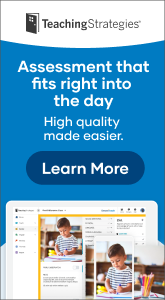May 24, 2024
Reflective Practice – Some Ways to Use It
There are some things you learn best in calm, and some in storm.
– Willa Cather (1873-1947), American writer
In an article on the Community Playthings blog, Ron Grady discusses the importance of reflective practice for early educators, writing:
“Yes, we all know that reflection is a critical piece of an early educator’s toolbox—a component of practice that deepens our appreciation of, and understanding of, young children. We admire those who do this. However, finding the right time for it…can be difficult if not frustrating. What, then, can we do to encourage our colleagues and ourselves to find and create time for this reflection that we know is so valuable in our day-to-day practice?”
Ron encourages reflective practice to become part of an on-going questioning process that can happen throughout the day at any time in a “reflective minute appended to a break (to use the restroom, grab coffee, eat a snack etc.)…inviting yourself to wonder…inserted here and there over the course of days and weeks.” He encourages using those minutes to ask “Why” and “What If” questions, providing the following example of questions that might be asked about “rough and tumble animal play”:
A child-centered “Why?” might ask: Why are the children so enthralled by this game? Why do the children insist on rough play as part of this game?
An educator-centered “Why?” might wonder: Why am I as an educator so unsettled by the children’s rough and tumble gross motor play?
A child-centered “What if?” might ask: What if the children had other ways to explore the juxtaposition of roughness and tenderness? What if we discussed the purpose and role of rough play in baby animals? Where might this lead and what might it reveal?
An educator-centered “What if?” might wonder: What if I change the language I use to describe play to myself, my colleagues, and in my documentation? What if I made efforts to find a more precise, respectful lexicon to describe the unfolding work of the children?
Another answer to Ron’s question about finding time for reflection can be found in the book, Making Adjustments: Meditations on Learning with Children (ROW) by Misa Okayama, edited by Ann Pelo and Margie Carter.
Okayama invites educators to see what is possible in reflective work with young children as she shares what she’s learned in her own practice. Throughout the book she provides ideas for incorporating reflection into daily work in a way that is highly supportive and enjoyable for both children and adults. Her premise is that it doesn’t have to be one more add-on to busy lives, but can actually become a way of being that makes everything better.
Share with the hashtag #ExchangeEveryDay
Print Friendly
Related
By Vanessa Cid













